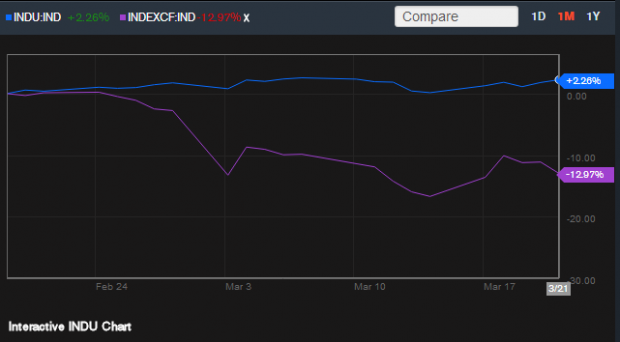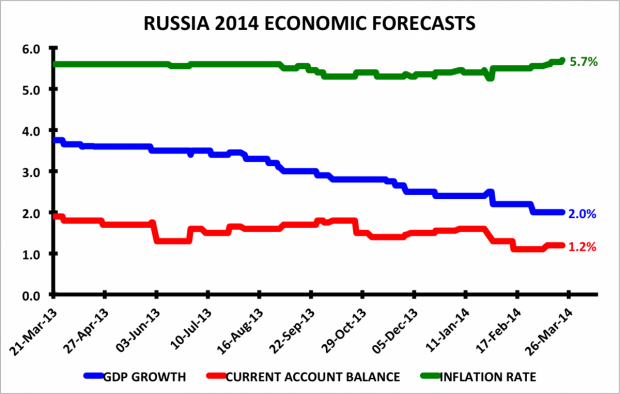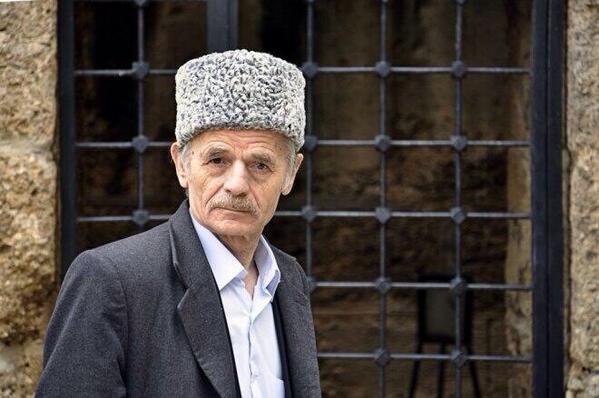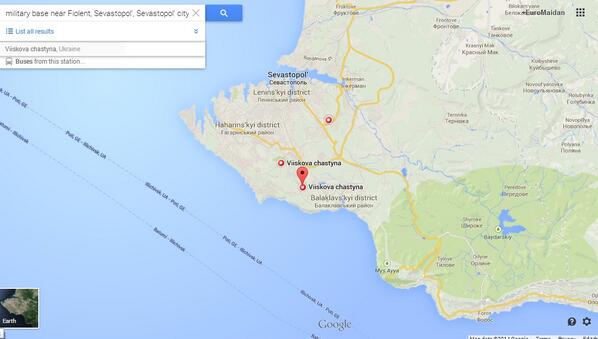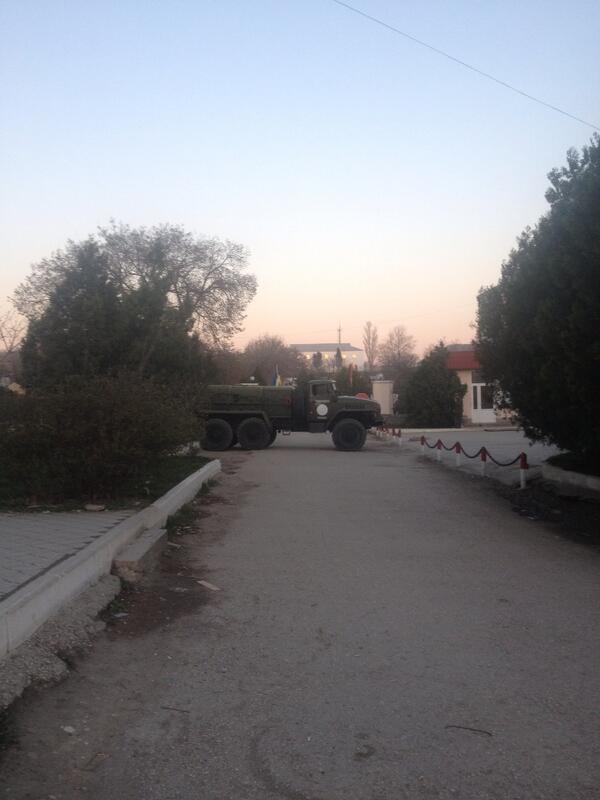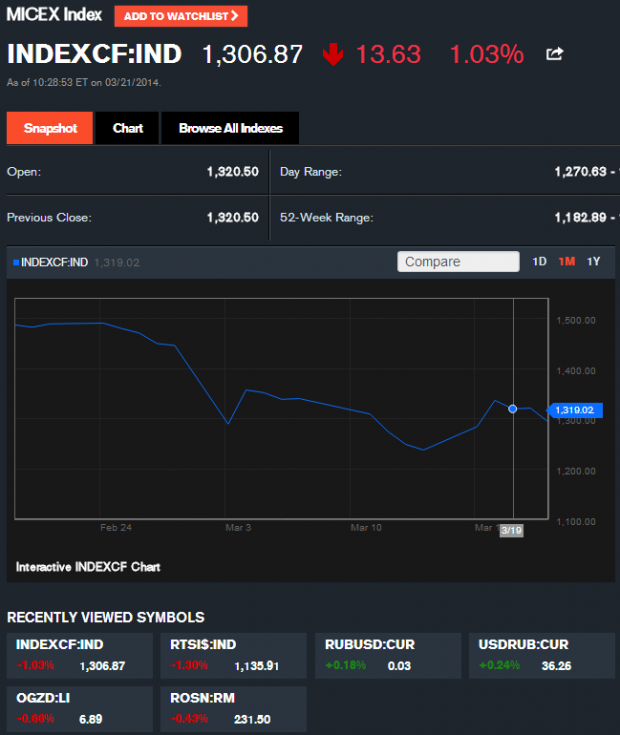The deadline for the withdrawal of Ukrainian soldiers from Crimea is passing, and the interim government has signed an agreement with the European Union, an agreement ripe with symbolism as this fulfills the wishes of the protesters that started this revolution in the first place.
Yesterday’s liveblog can be found here. For an overview and analysis of this developing story see our latest podcast.
Please help The Interpreter to continue providing this valuable information service by making a donation towards our costs.
Below, we will be making regular updates throughout the day:
2010 GMT: Of course, Russia’s flagship propaganda channel doesn’t think the Russian economy is foundering — it’s only in flux while Putin makes it stronger:
#Sanctions effect: Russia to change its economic partners…for the better (Op-Edge) http://t.co/lYUi5J0KrX pic.twitter.com/XReTO1e1J9
— RT (@RT_com) March 21, 2014
RT’s “op-edge” reports:
Western sanctions might push Russia to deepen cooperation with BRICS states, in particular, to strengthen its ties with China, which will possibly turn out to be a big catastrophe for the US and the EU some time later.
On March 18, the spokesperson for the Kremlin, Dmitry Peskov, claimed in a BBC interview that Russia would switch to new partners in case of economic sanctions being imposed by the European Union and the United States. He highlighted that the modern world isn’t unipolar and Russia has strong ties with other states as well, though Russia wants to remain in good relations with its Western partners, especially with the EU due to the volume of deals and joint projects.
Those “new partners” are not really new since Russia has been closely interconnected with them for almost 13 years. This is all about the so-called BRICS organization, consisting of Brazil, Russia, India, China and South Africa. BRICS represents 42 percent of the world’s population and about a quarter of the world’s economy, which means that this bloc of states is an important global actor.
Of course this is exactly what Russia is seeking to do — expand trade with BRICS nations, as well as with nations that the rest of the world counts as pariah states. The reality for Russia, however, is that its economy was already looking shaky, and so the additional blows it has received in the last month may damage it further.
RT’s “op-edge” ends by saying that Russia is investing heavily in US and EU markets, and so the move towards dealing with BRICS as an alternative to the US will have a big impact on the US economy. Well, we’ve covered extensively how the Russian markets have reacted to this crisis, so let’s take a look at American markets. Let’s just quickly compare the Dow Jones to the Russian MICEX over the last month:
Hmmm… I guess there’s a problem with RT’s theory.
1955 GMT: The question we’ve been asking for weeks: will the price that Russia pays for Crimea be enough to be a deterrent for further aggressive expansion? A related question is whether Russia can pay the price. The fact remains that Russia’s economy has been slowing for the better part of a year, 2014 looked like it would lead to more slowing, and that was before this crisis hit. Since February 18th, the ruble, and the Russian stock markets, have shed value at alarming rates. And that was before new sanctions targeted a Russian bank, and credit ratings agencies downgraded Russia, making it harder for them to get loans and increasing their interest rates. Business Insider has published an article illustrating this point, THE TRUTH ABOUT RUSSIA: 5 Charts That Show What A Disaster The Economy Is Under Putin. Here’s just one of the charts:
The bad economic news is made even worse once one understands that Russia has pinned their entire economy to the price of oil and gas, and that business is good but it still hasn’t been enough to create growth:
Finally, it’s important to remember that, as Financial Times correspondent Joseph Cotterill puts it, “The entire economy is a giant oil-price proxy.”
S&P spent some time on this point in its discussion of its ratings outlook revision.
“The Russian government’s finances continue to be buoyed by strong commodity revenues, particularly from oil,” said the rater.
“Based on our expectation that commodity revenues will decline slightly on the back of a slightly weaker oil price (falling to $95 by 2015), we think the general government deficit will gradually worsen, reaching 1.5% of GDP by 2016, just outside the level targeted by the fiscal rule, and implying an average annual change in general government debt of 1.5% of GDP over 2013-2016.”
1937 GMT: Japan has given Ukraine a 10 billion hryvnia low-interest loan (about $1 billion) for the reconstruction and development of advanced waste water, rainwater collection, and sewage plants, Channel 5 reports.
1933 GMT: The Russian Navy scuttled several ships to block passage for the Ukrainian navy, and while Russian troops are seizing Ukraine’s naval vessels one by one, some of them appear to be hard at work:
Video: #Ukrainian Minesweeper “Cherkasy” attempts 2 pull away the sunk ship & free the passage http://t.co/RfDBeLhoks |PR Video #Crimea
— Euromaidan PR (@EuromaidanPR) March 21, 2014
1928 GMT: A sign that Russia will retaliate against Tatar leaders who are not cooperative? The official Twitter account for the Crimean Tatar Parliment Representation to the EU reports:
Mustafa Cemilev, leader of the Crimean Tatars & Ukrainian MP declared “non grata” in #Crimea by Russian authorities. pic.twitter.com/yPkzHflMDq
— EU Crimean Tatar (@CrimeaEU) March 21, 2014
Crimean leader & Ukrainian MP Mustafa Cemilev’s entry to #Crimea is restricted by the Russian authorities. pic.twitter.com/QMjtLpBttz
— EU Crimean Tatar (@CrimeaEU) March 21, 2014
1924 GMT: Ukraine’s Channel 5 is reporting that the only Ukrainina submarine, the Zaporozhye, was captured by Russian soldiers who threw grenades into the water to threaten the crew.
TSN.UA also reports that several dozen Ukrainian soldiers have surrendered to Russian troops in Kerch, the eastern-most port on Crimea.
Global Post News has more on yesterday’s seizing of one of Ukraine’s largest ships:
As the flags go down one by one on Ukraine’s fleet in Crimea, Russian forces are laying siege to the few ships left in a strongly pro-Russian community that is hostile to the new government in Kiev.
The Ternopil and Slavutich, Ukraine’s biggest ships in Sevastopol, once stood side by side on the north side of the bay.
Thursday evening, the Ternopil, a corvette built to repel submarines, was stormed by Russian forces and towed across the bay.
On Friday, it was moored next to a Russian Black Sea fleet ship, its mast now flying the white and blue Russian navy flag.
The command ship Slavutich — which was still flying the Ukrainian flag on Friday — has been left in hostile territory and the pathway leading to it blocked by Russian military and pro-Moscow militias.
1612 GMT: In all the focus on the international response to this crisis, one could forget that the crisis itself is far from over, and today is a very tense day in Crimea. A truce between Russian forces and the Ukrainian military expires today, and Ukrainian forces, while supposedly making preparations to leave the peninsula, have not yet left. There are a flurry of reports on this tension. Here is one we’ve yet to confirm:
#Ukrainian military base at Fiolent cape, #Sevastopol, has captured by #russian occupiers -channel5 |PR News #Crimea pic.twitter.com/EbuTMbhHWb
— Euromaidan PR (@EuromaidanPR) March 21, 2014
The Telegraph’s Roland Oliphant reports from outside Belbek, where tensions have been high all week. The base commanders have been told to surrender multiple times by various groups of Crimean self-defence forces, and by Russian troops:
Belbek: Russians showed up 10 am, said surrender weapons and quit peninsular. Ukrainians refused. All quiet since. Still no orders from Kiev
— Roland Oliphant (@RolandOliphant) March 21, 2014
Ukrainians say 10 APCs and 1 Kamaz have taken up positions above HQ building. But not visible to me and couldn’t get close enough to check.
— Roland Oliphant (@RolandOliphant) March 21, 2014
The world famous truck of Belbek, from a different angle. pic.twitter.com/zZ1dlSzOA9
— Roland Oliphant (@RolandOliphant) March 21, 2014
1557 GMT: The EU has released their official list of the Russian officials who have been sanctioned. It matches the list posted by The Telegraph earlier (see below).
The list is mostly Russian officials associated with calling for the annexation of Crimea. But the list also includes both Russia’s military commanders and the Crimean commanders and politicians who are responsible for Russia’s annexation and the troops on the ground in Crimea.
But perhaps the most interesting person on the list is a man by the name of Dmitry Kiselyov. Kiselyov is the editor of Russia Segodnya (Russia Today), the new formulation of a formerly respected Russian state-owned media outlet RIA Novosti. Kiselyov is an old-school pro-Kremlin hatchet-man, and his antics are infamous. He’s been in the headlines this week because he gave a televised speech where he reminded everyone that Russia was the only country that could “reduce America to nuclear ash.”
If you really want to look into his eyes and see his soul, a good place to start would be the first speech he gave after taking over RIA Novosti.
1551 GMT: The head of Naftohaz (of Naftogaz), the oil and gas giant in Ukraine, has been arrested. RFE/RL reports:
Naftohaz head Yevhen Bakulin has been detained for taking part in organized crimes causing at least $4 billion in damages to Ukraine… Acting Interior Minister Arsen Avakov says he will “react harshly and publicly against any attempt to exert pressure on the investigation.”
1529 GMT: The Telegraph reports that it has received an exclusive copy of the list of Russian individuals who will be sanctioned by the EU. The list is as follows:
1. Rogozin, Dmitry Olegovich – Deputy Prime Minister of the Russian Federation
2. Glazyev, Sergey – Adviser to the President of the Russian Federation
3. Matviyenko, Valentina Ivanova – Speaker of the Federation Council
4. Naryshkin, Sergei Evgenevich – Speaker of the State Duma
5. Kiselyov, Dmitry Konstantinovich – Head of the Russian Federal State news agency Rossiya Segodnya
6. Nosatov, Alexander – Deputy Commander of the Black Sea Fleet
7. Kulikov, Valery Vladimirovich – Deputy Commander of the Black Sea Fleet
8. Surkov, Vladislav Yurievich – Aide to the President of the Russian Federation
9. Malyshev, Mikkhail – Chair of the Crimea Electoral Commission
10. Medvedev, Valery – Chair of Sevastopol Electoral Commission
11. Lt. Gen. Igor Turchenyuk – Commander of Russian forces in Crimea
12. Mizulina, Elena Borisovna – Deputy in the State Duma
1505 GMT: Are Moldova and Georgia “next”? The Wall Street Journal reports that there is evidence that Russia is tightening pressure on both countries, and the European Union has now sped up the process of finalizing trade and political deals with both countries as an emergency measure to counter Russian influence.
Moldova already has to grapple with the separatist region of Transnistria which long ago sought independence and has close ties with Moscow.
The country is also highly vulnerable to Russian economic pressure. Hundreds of thousands of Moldovans have Russian work visas. If Moscow were to scrap those and force large numbers of unemployed people back home, it could exert huge pressure on Mr. Leanca’s government.
The EU has already moved to help Moldova. It lifted quotas on Moldova’s wine exports when Russia stopped imports last year. It has also offered Moldova a visa deal which will greatly ease its citizens’ access to the 28-nation bloc.
As we’ve been reporting, US Senate leaders John McCain and Dick Durbin have been on a conference call today, and the subject of Moldova and Georgia came up.
6 yrs ago Putin invaded Georgia and remains. Now Crimea. What next? We must pre-empt his next invasion says @SenatorDurbin
— Damon M. Wilson (@DamonMacWilson) March 21, 2014
On #ACUkraine @SenJohnMcCain mentions #Moldova 5x so far. He’s focused on protecting this fragile democracy. Expects Putin has in radar.
— Damon M. Wilson (@DamonMacWilson) March 21, 2014
Respond to crisis by expediting membership of #Georgia #Montenegro #Moldova into NATO says @SenJohnMcCain #ACUkraine
— Damon M. Wilson (@DamonMacWilson) March 21, 2014
.@SenJohnMcCain tells @FAZ_net in @AtlanticCouncil call: #Moldova is somewhere in #Putin‘s calculation. #ACukraine
— Fred Kempe (@FredKempe) March 21, 2014
.@SenJohnMcCain to @AnnetteHeuser on @AtlanticCouncil call: Not clear what #Putin will do next but he has everything in place for next steps
— Fred Kempe (@FredKempe) March 21, 2014
Both leaders were also defensive about NATO, and rejected the argument, made by Russia, that NATO is an aggressor.
.@SenJohnMcCain Those who argue that #NATO enlargement is provocative are wrong. @NATO is defensive. Nations ask to join. Not coerced.
— Damon M. Wilson (@DamonMacWilson) March 21, 2014
.@SenJohnMcCain rejects the “we provoked Russia” argument. Naive or calculated to fault NATO enlargement for Putin’s naked aggression.
— Damon M. Wilson (@DamonMacWilson) March 21, 2014
1448 GMT: After both the EU and the United States placed additional sanctions on Russia, and with the Russian economy faltering, major credit agencies are cutting Russia’s credit ratings. Bloomberg reports:
Russia’s credit rating outlook was cut to negative by Fitch Ratings, citing the potential impact on a slowing economy of widening U.S. and European Union sanctions imposed as it absorbs Ukraine’s Crimea region.
Fitch followed a similar move by Standard & Poor’s yesterday. Both companies affirmed the former Soviet republic at BBB, the second-lowest investment grade, on par with Brazil. Yields on 10-year sovereign ruble bonds rose to 9.66 percent, within 13 basis points of the five-year high on March 14, while The ruble continued declines.
Taking a look at Russia’s markets, after a few days of modest recovery, following weeks of loss, stocks are again down by more than 1%:
1440 GMT: More from the conference call between Senate leaders John MCCain and Dick Durbin, McCain who was sanctioned already yesterday by Russia and Durbin who may be in the next wave of sanctions, and both of whom are leading the bipartisan Senate response to this crisis:
.@SenJohnMcCain warns @AtlanticCouncil call: 19th century still prevails in Putin’s mind—his dream & goal is restoration of a Russian empire
— Fred Kempe (@FredKempe) March 21, 2014
.@SenatorDurbin tells @AtlanticCouncil members: #Putin can feel the pain when we stand together on economic sanctions. #ACukraine
— Fred Kempe (@FredKempe) March 21, 2014
.@SenJohnMcCain underscores importance of restructuring European energy politics, loosen #Moscow‘s grip. #ACukraine @AtlanticCouncil call
— Fred Kempe (@FredKempe) March 21, 2014
And now the call addresses domestic politics:
.@SenJohnMcCain: You can’t call yourself a Reagan Republican if you block Ukraine aid in its time of need b/c of other issues. #ACUkraine
— Damon M. Wilson (@DamonMacWilson) March 21, 2014
.@SenatorDurbin: Obama was not signaling Putin, but reassuring Congress he would not ask to use force so we can focus on how best to help.
— Damon M. Wilson (@DamonMacWilson) March 21, 2014
1425 GMT: US Senator John McCain, an outspoken critic of Russian actions in Ukraine, was sanctioned yesterday by Russia. His tweets said he took this as a badge of honor, and his official statement, usually a stodgy and carefully-calculated medium, was completely sarcastic:
Washington, D.C. – U.S. Senator John McCain (R-AZ) today released the following statement on being sanctioned by Russian President Vladimir Putin:
“I guess this means my spring break in Siberia is off, my Gazprom stock is lost, and my secret bank account in Moscow is frozen. Nonetheless, I will never cease my efforts on behalf of the freedom, independence, and territorial integrity of Ukraine, including Crimea.”
Today, John McCain is spearheading a bipartisan effort to increase pressure on Russia, along with Democratic Senator and Majority Whip Dick Durbin:
On @AtlanticCouncil conference call on Ukraine crisis now with @SenJohnMcCain @SenatorDurbin – forging bipartisan consensus to back Ukraine.
— Damon M. Wilson (@DamonMacWilson) March 21, 2014
.@SenJohnMcCain on @AtlanticCouncil call: The higher the price #Putin pays for further aggression the more likely he will stop. #ACukraine
— Maks Czuperski (@MaksCzuperski) March 21, 2014
On @@AtlanticCouncil call, @SenJohnMcCain says what Putin does next is directly related to what he assess he will have to pay. #Ukraine
— Damon M. Wilson (@DamonMacWilson) March 21, 2014
Nonproliferation regime undermined by Russia’s seizure of Crimea says @SenJohnMcCain on @AtlanticCouncil call
— Damon M. Wilson (@DamonMacWilson) March 21, 2014
This last tweet is in reference to the fact that Ukraine directly negotiated with Russia to give up its nuclear weapons — a move that many are second guessing now.
On @AtlanticCouncil call, @SenatorDurbin says Yanukovych hollowed out Ukraine military, not ready to fight, only 6K ready for battle.
— Damon M. Wilson (@DamonMacWilson) March 21, 2014
We’d note that while this is the official Ukrainian government position, The Interpreter’s Andrew Bowen notes that this is likely an exaggeration, and Ukraine’s military, while severely weakened, is stronger than this.
.@SenJohnMcCain urges US send defensive weapons to #Ukraine now on @AtlanticCouncil conference call.
— Damon M. Wilson (@DamonMacWilson) March 21, 2014
Putin is returning us to old-USSR practice of telling outright lies says @SenJohnMcCain
— Damon M. Wilson (@DamonMacWilson) March 21, 2014
.@SenJohnMcCain says ‘gradualism’ not sufficient in Ukraine. Need decisive package. #ACUkraine
— Damon M. Wilson (@DamonMacWilson) March 21, 2014
Both @SenatorDurbin & @SenJohnMcCain call for urgent bipartisan Congressional action on Ukraine aid ASAP next week. #ACUkraine
— Damon M. Wilson (@DamonMacWilson) March 21, 2014
1406 GMT: Ukraine has moved one step closer to joining the European Union today, by signing the core elements of an association agreement. When the former President, Viktor Yanukovych, failed to sign this agreement last fall, it sparked protests that culminated on February 18th, the start of five days of revolution that will permanently be remembered at the birth of a new government in Ukraine:
Ukrainian Prime Minister Arseny Yatseniuk, EU leaders Herman Van Rompuy and Jose Manuel Barroso, and the leaders of the bloc’s 28 nations signed the core chapters of the Association Agreement on the sidelines of an EU summit in Brussels.
The deal commits Ukraine and the EU to closer political and economic cooperation, although more substantial parts of the agreement concerning free trade will only be signed after Ukraine has held new presidential elections in May.
Van Rompuy, the European Council president, said the agreement would bring Ukraine and its 46 million people closer to the heart of Europe and a “European way of life”.
